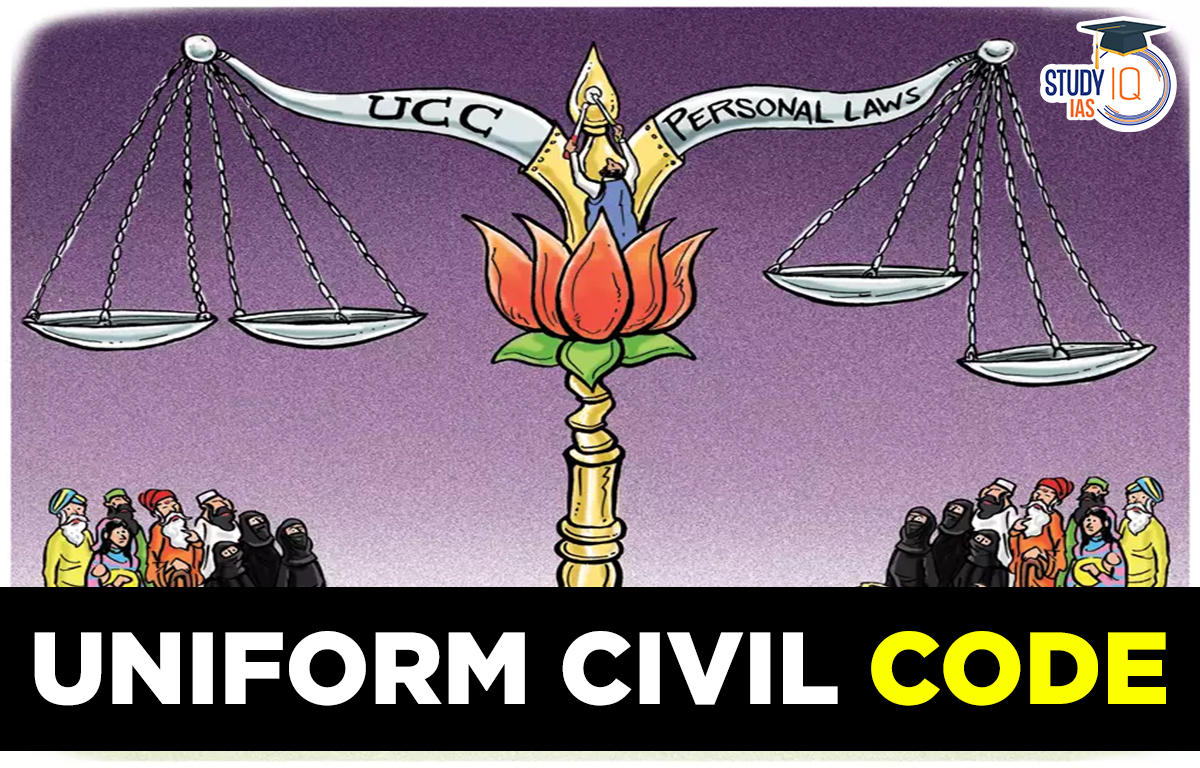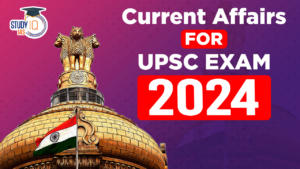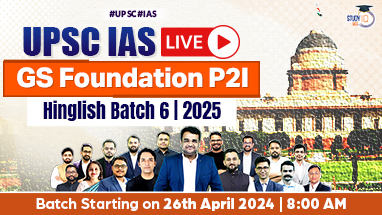Table of Contents
Context: Recently Karnataka reiterated its commitment to implementing the uniform civil code (UCC) in its election manifesto.
About Uniform Civil Code
- The word “uniform” refers to rules that apply equally to all residents regardless of their sexual orientation, gender, or affiliation with a particular religion. A Uniform Civil Code seeks to provide one law for the entire country, applicable in their personal matters such as marriage, divorce, inheritance, adoption etc.
- It dates to colonial India when the British government submitted its report in 1835 stressing the need for uniformity in the codification of Indian law relating to crimes, evidence, and contracts, specifically recommending that personal laws of Hindus and Muslims be kept outside such codification.
- An increase in legislation dealing with personal issues at the far end of British rule forced the government to form the B N Rau Committee to codify Hindu law in 1941.The 1937 Act was reviewed, and the committee recommended a civil code of marriage and succession for Hindus.
Inclusion in DPSP: The Uniform Civil Code (UCC) was included in the Directive Principles, not in the Fundamental Right which is enforceable by the Court of Law due to the following reasons:
- The stand taken by B.R. Ambedkar in the Constituent Assembly was that a UCC is desirable but for the moment should remain voluntary.
- Article 44: The “State shall endeavour to provide for its citizens a uniform civil code (UCC) throughout the territory of India.”
- Article 37: The “state shall endeavour by suitable legislation”, while the phrase “by suitable legislation” is absent in Article 44.
Need of Uniform Civil Code
- Ensuring equality: Presently, in India, different communities are governed by different Personal laws like Hindu Marriage Act 1955, Hindu Succession Act 1956, Hindu Adoption and Maintenance Act 1956. Similarly, Muslims, Parsis and Christians are governed by their own personal laws.
- Even within a religion, there is not a single common personal law governing all its members. E.g. For registration of marriage among Muslims, laws differ from place to place. It was compulsory in J&K (1981 Act), and is optional in Bengal, Bihar (both under 1876 Act). It can be argued that the Personal Law system violates the principle of equality of the Constitution.
- Supreme Court in Indian Young Lawyers Association v. State of Kerala (2018) stated that personal/customary law comes under the ambit of Article 13. No body of practices can claim supremacy over the Constitution and its vision of ensuring dignity, liberty and equality.
- Needed for national integration: Uniform Civil Code will separate religion from social relations and personal laws, ensuring equality and thus harmony in the society.
- In Mohd. Ahmed Khan v Shah Bano Begum (1985), Supreme Court observed that, “A common civil code will help the cause of national integration by removing disparate loyalties to law which have conflicting ideologies.”
- Gender Justice: UCC will promote gender justice by removing the inbuilt discriminatory provisions of personal laws.
- Under the Hindu law, the Mitakshara branch of law denied to a Hindu daughter a right by birth in the joint family estate and this flowed logically from the fact that her place in the paternal family was only temporary as she belonged to her husband’s family on marriage.
- Islamic law prescribes that generally a man’s share of the inheritance is double that of a woman in the same degree of relationship to the deceased. Under Muslim law, the father is the sole guardian of the person and property of his minor child.
- Freedom of Choice: A religion neutral personal law would encourage protection of couples in case of inter-caste and inter-religious marriages.
- Even Acts like the Special Marriage Act, 1954 permits any citizen to have a civil marriage outside the realm of any specific religious personal law.
UCC: Supreme Court’s various judgements since 1985
- Shah Bano Case: SC declared the practice of Triple Talaq (talaq-e-bidat) as unconstitutional and made it a criminal offense stating that “A common civil code will help the cause of national integration by helping different loyalties to the conflicting ideologies”
- Daniel Latifi Case: The Muslim Women’s Act (MWA) was challenged on the grounds that it infringed on Articles 14 and 15 of the Constitution, as well as Article 21 of the Constitution. Supreme Court harmonized it with section 125 of the CrPC, ruling that a divorced Muslim woman is entitled to maintenance for the rest of her life or until she remarries.
- Sarla Mudgal Vs Union of India: The court held that the Hindu marriage solemnized under Hindu law can only be dissolved on any of the grounds specified under the Hindu Marriage Act 1955. Conversion would not by itself dissolve the Hindu marriage under the act and thus, a second marriage solemnized after converting to Islam would be an offense under section 494 of the Indian Penal Code(IPC).
- John Vallamattom case: The Supreme Court held “It is regrettable that Article 44 of the Constitution has not entered into force. A common civil code will help the cause of national integration by removing contradictions based on ideologies.”
Secularism vs UCC: There are various interpretations of secularism. Some factions of our society consider the UCC anti secular while some regard it as the harbinger of communal harmony and secularism.
- The Supreme Court in T.M.A Pai Foundation v. State of Karnataka reiterated that the essence of secularism in India is recognition and preservation of the different types of people. Many experts argue that personal laws are the part and parcel of religion and culture.
- Any interference with the personal laws would be tantamount to interference with the very way of life of those who had been observing such laws from generation to generation. State must not do anything which hinder the religious and cultural ethos of the people.
- While others argue that Uniform Civil Code is not opposed to secularism and will not violate Article 25 and 26 of the Constitution of India.
Challenges and issues related to UCC
- Existence of legal pluralism in civil laws: Indian laws do follow a uniform code in most civil matters – Indian Contract Act, Civil Procedure Code, Sale of Goods Act, Transfer of Property Act, Partnership Act, Evidence Act etc. there is diversity even under these secular civil laws.
- Contradictory provisions of the Constitution: Articles 371 (A) to (I) and the sixth schedule of the constitution of India provides certain protections or rather exceptions to the states of Assam, Nagaland, Mizoram, Andhra Pradesh and Goa with respect to family law.
- While uniformity in personal laws is envisaged through the Article 44, the inclusion of personal laws in concurrent list indicates protection of diversity in personal laws.
- While framing a law it must be borne in mind that cultural diversity cannot be compromised to the extent that our urge for uniformity itself becomes a reason for threat to the territorial integrity of the nation
- Nagaland witnessed a strong protest provision of reservation of 33% seats for women. The ground for such opposition was that the carving out of reservations for women confirms their status as inferior and in need of special protection.
- Plurality and diversity: It has been argued that UCC threatens a pluralistic society like India, where people have confidence in their respective religious beliefs or doctrines that have been presented by different religions.
- In 2018, Law Commission of India opined that the Uniform Civil Code is “neither necessary nor desirable at this stage” in the country. The Commission said secularism cannot be contradictory to plurality. It only ensures peaceful co-existence of cultural differences. It is this plurality that also makes it difficult to evolve consensus on UCC.
- Issue of Drafting the UCC: One of the biggest obstacles in implementing the UCC, apart from obtaining a consensus, is the drafting. There is no guideline whether UCC be a blend of all the personal laws or a new and common law adhering to the constitutional mandate.
- Concerns of Minorities: There are impediments when it comes to addressing Minority concerns, such as separatism, and misconceived notions about personal laws. Most minorities feel a sense of insecurity, loss of identity and marginalization within Indian society and imposition of a majoritarian outlook on minority religions, if UCC comes into play.
Way Forward
- An important step would be to constitute a Muslim Law Reforms Committee, Tribal and Indigenous Law Reform Committee, Christian & Parsi Law Reforms Committees, just like the Hindu Law Reforms Committee formed in 1941. Based on their recommendations, government could take the reforms process
- Making UCC voluntary: If a person is free to choose whether they want to be governed by personal law, or by a non-religious civil code, there is no reason why UCC and personal laws cannot co-exist, instead of one replacing the other. For example: People who do not wish to marry under personal laws can marry under the Special Marriage Act (albeit not without problems and inconveniences).


 Current Affairs 19th April 2024 for UPSC...
Current Affairs 19th April 2024 for UPSC...
 Private investment, Trend in India, and ...
Private investment, Trend in India, and ...
 Maoist Insurgency, Current Scenario and ...
Maoist Insurgency, Current Scenario and ...

















